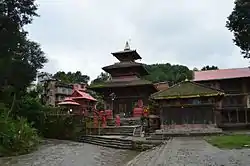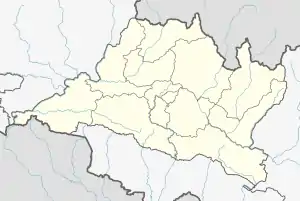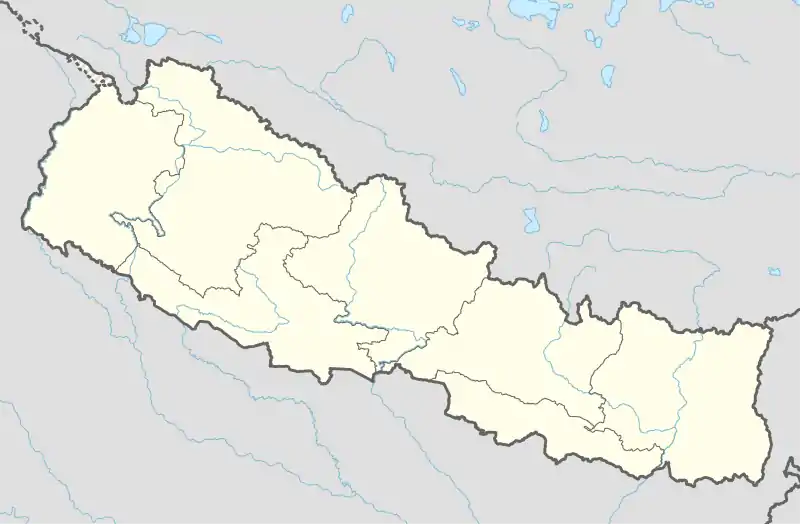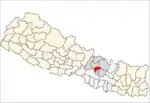Gokarneshwar
Gokarneshwar is a municipality in Kathmandu District in the Bagmati Pradesh of Nepal that was established on 2 December 2014 by merging the former Village development committees Sundarijal, Nayapati, Baluwa, Jorpati and Gokarna.[1][2] The office of the municipality is that of the former Jorpati village development committee. The river Bagmati has its origin as the name Bagh Dwar situated in the middle of the Shivapuri jungle in this municipality. In the village on the banks of the Bagmati River stands the Gokarna Mahadev temple, built in 1582.[3] In late August or early September people go to this temple to bathe and make offerings in honor of their fathers, living or dead, on a day called Gokarna Aunsi.[4]
Gokarneshwor Municipality
गोकर्णेश्वर नगरपालिका | |
|---|---|
 | |
 Gokarneshwor Municipality Location in Nepal  Gokarneshwor Municipality Gokarneshwor Municipality (Nepal) | |
| Coordinates: 27°44′0″N 85°23′0″E | |
| Country | |
| Province | Bagmati |
| District | Kathmandu |
| Established | 2014 |
| Government | |
| • Mayor | Santosh Chalise (NC) |
| • Deputy Mayor | Shanti Nepal (NC) |
| Area | |
| • Total | 58.5 km2 (22.6 sq mi) |
| Population | |
| • Total | 107,351 |
| • Density | 1,800/km2 (4,800/sq mi) |
| • Ethnicities | Newar Brahman Chhetri Tamang Magar |
| Time zone | UTC+5:45 (NST) |
| Website | gokarneshwormun |
The Gokarna Forest Reserve is located in the area. Nepal Medical College and Teaching Hospital is located Southwest of Gokarneshwar.
Schools
Some of the well renowned schools in the municipality are East-Pole Higher Secondary School, Manakamana Secondary School, Bouddha International School, Venus Public School, Nava Arunima School and HIMS school. The municipality has large number of educational institutions in the nation, trailing just behind Kathmandu Mahanagarpalika.
Population
municipality has a total population of 107,351 according to 2011 Nepal census.[5] At the time of the 2011 Nepal census the village had a population of 7,508 with 1,768 households.[6]
Notable residents
Writer Ramesh Bikal was born near Gokarna in 1932.[7]
Gallery

References
- "Govt announces 61 municipalities". The Kathmandu Post. 3 December 2014. Retrieved 2 December 2014.
- "Govt creates 61 new municipalities". República. 3 December 2014. Retrieved 2 December 2014.
- B. Mayhew, J. Bindloss, and S. Armington (2006). Nepal. 7th Edition, Lonely Planet. ISBN 1-74059-699-4
- David Reed; James McConnachie (2002), The rough guide to Nepal, Rough Guide Travel Guides (5, illustrated ed.), Rough Guides, pp. 188, 204, ISBN 9781858288994
- "2011 Nepal census (Ward Level)" (PDF). Central Bureau of Statistics. November 2012. Archived from the original (PDF) on 2013-07-31. Retrieved November 2012. Check date values in:
|access-date=(help) - Government of Nepal, National Planning Commission Secretariat, Central Bureau of Statistics (November 2012). National Population and Housing Census 2011 (Village Development Committee/Municipality) (PDF). 02, NPHC 2011. Kathmandu. Archived from the original (PDF) on 2013-09-27. Retrieved 2014-07-10.CS1 maint: multiple names: authors list (link)
- Himalayan Voices: An Introduction to Modern Nepali Literature (Voices from Asia), edited and translated by Michael J. Hutt, University of California Press, 1991. p. 244. ISBN 9780520910263


